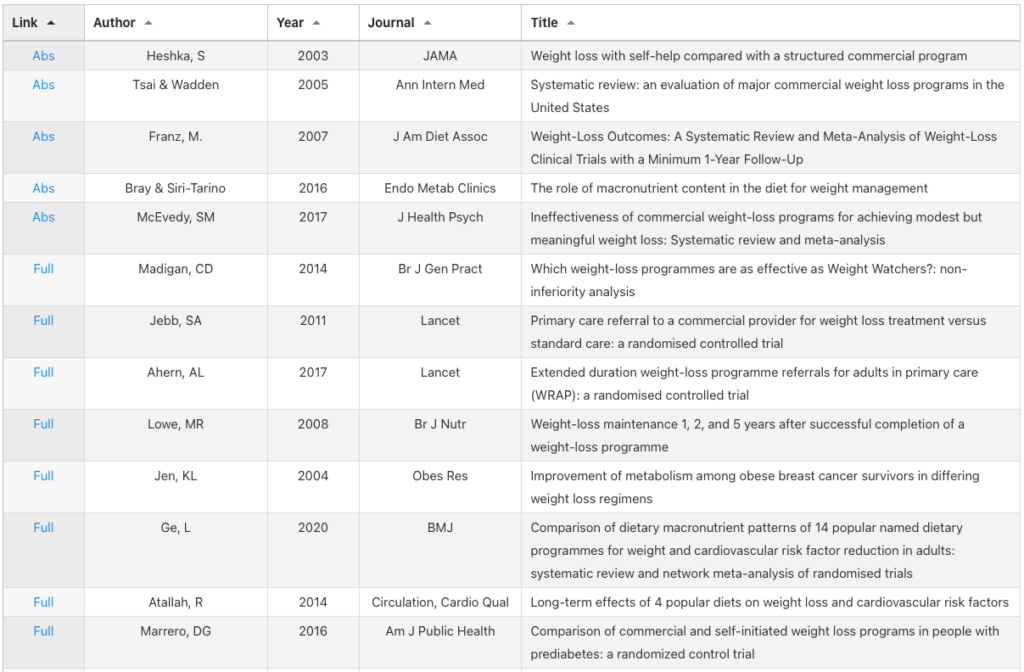Weight Watchers Ushers in a New Era in Weight Loss

The decision for the iconic weight loss brand, Weight Watchers, to add weight loss medication to their program offerings has ushered in a new era in the weight loss industry. For decades Weight Watchers promoted counting calories as part of a points system to incur a negative energy balance to promote weight loss. More recently, they have rebranded themselves (WW) to promote more body positivity. Like most weight loss programs, Weight Watchers provided very limited long-term (1 year+) weight loss success, often resulting in <5% of weight lost after one year of being on the program.
The lack of Weight Watchers success wasn’t for a lack of trying. They, out of anyone, have some of the best researchers and research done on any weight loss program. I’ve compiled a list of most of their electronically available studies in table 1 below.
The ineffectiveness of calorie counting to lose weight really opened the door to diets focusing on macronutrient content (i.e., low-fat, low-carb, high-protein) or meal timing (i.e., alternate day fasting, time restricted feeding). These diet regiments are equally ineffective in providing long-term weight loss to their users. Please see The Paper Database for a list of research performed on different macronutrient and meal timing diets.
With the way the weight loss industry is going (towards weight loss medications), the competition from other providers (i.e., Calibrate, Noom), coupled with their own research, it is of little wonder why Weight Watchers has decided to make the push into telehealth and prescribing weight loss medications. The writing on the wall was obvious. There were newer, younger, sexier kids on the block and they had to change or risk becoming irrelevant.
The decision for Weight Watchers to add telehealth and weight loss medication to their programming is part of a larger ongoing trend, one that I have my own questions about that I want to share with you now.
First, I get why some people are eager to take weight loss medications. Their lives are busy, stressful, and they are time starved. They have tried every diet under the sun to lose weight but nothing seems to work in the long-term. Why wouldn’t they want to try a medication that all but guarantees you to lose at least 10% of your body weight and keep it off? To me, it’s a no-brainer.
But there are some important points to consider.
- To prescribe weight loss medications, the Food and Drug Administration (FDA) requires a lifestyle management program to run concurrently to the drug. My question is, how comprehensive are the lifestyle management programs? Are there a few handouts and weblinks or are they actually comprehensive, professionally guided programs?
- Will people adopt the lifestyle management program into their lives or will they take the path of least resistance, essentially not change their diet or exercise, and just let the pill do its thing?
- Let’s say people take the weight loss medication for one year. If they don’t meet certain body mass index (BMI) and other comorbidities, insurance may no longer cover the cost of the medication. How expensive is the medication and what happens when and if they go off it? As my friend, Jeff Burkart, has pointed out to me, would you rather pay for training sessions or medication? What’s going to help you more long-term?
- If people go off the medication, for one reason or another, weight regain is very likely to happen if comprehensive lifestyle changes were not made. When they gain the weight back, will they then be re-eligible to have insurance cover the cost of the medication? And will people now enter a new type of yo-yo dieting, only this time at the hands of a medication?
- Will people have to take the weight loss medication for the rest of their lives? You can’t just take a weight loss medication, lose weight and say, “I’m fixed, I don’t need to take my medicine anymore”. Certainly, there are some people who will no longer need to take their medication, but if history is any lesson, most people that go on statins, blood pressure medication or metformin, don’t go off their medication. It is now part of their lifelong disease management.
- Will tastes and hunger change after one year of medication and weight loss? I can see two different situations where a comprehensive lifestyle management program was not adopted. One in which a person has gotten “used to” eating far fewer calories, tastes have changed, and they are less likely to overconsume and gain the weight back. The other, which I feel is more likely, is that people’s tastes will not change, hunger will return, and weight gain will ensue. Bariatric surgery is a case in point. Although tastes do change, it is not uncommon for people to go back to their old habits and “out-eat” their surgery, stretch out their stomachs, and gain much of the weight they lost back. I’m afraid that this may happen with medication alone as well.
At the end of the day, successful long-term weight management is still dependent on diet and exercise. There is no exercise pill. Sure, there is testosterone and EPO for increasing muscle mass and oxygen carrying capacity respectively, but both are controlled substances that effectively work even without exercise, but there is no exercise pill. It is impossible to mimic all of the systematic adaptations that exercise provides.
I’ve said it time and time again, that diet is more important than exercise to weight loss. It’s funny now, that since weight loss medications are becoming so culturally mainstream, that diet has really had its legs cut out from under it. If you can take a diet pill that is as effective as dieting, without all the extra effort, why diet at all? I think that’s a totally relevant question. My answer to that would be 1) do you want to take a weight loss medication for the rest of your life and 2) why wouldn’t you want to create long-lasting healthy diet patterns and take the medication to maximize your weight loss? Once your patterns are established, yes, it still takes work to eat healthy, but you still have to eat. Why not create a streamlined, systematic, way of eating that you can do the rest of your life?
I think it is going to be a really interesting real-life experiment to see how many people make lasting dietary changes, how many people choose to take weight loss medication forever, and how many people gain back the weight they have lost. I don’t know the answers to any of these questions, but I am excited to see how it plays out. Weight Watchers is adopting prescription medications for weight loss and in doing so has ushered in a new era in the weight loss industry. Things will never be the same. Will it be a good thing or a bad thing, only time will tell.





Responses